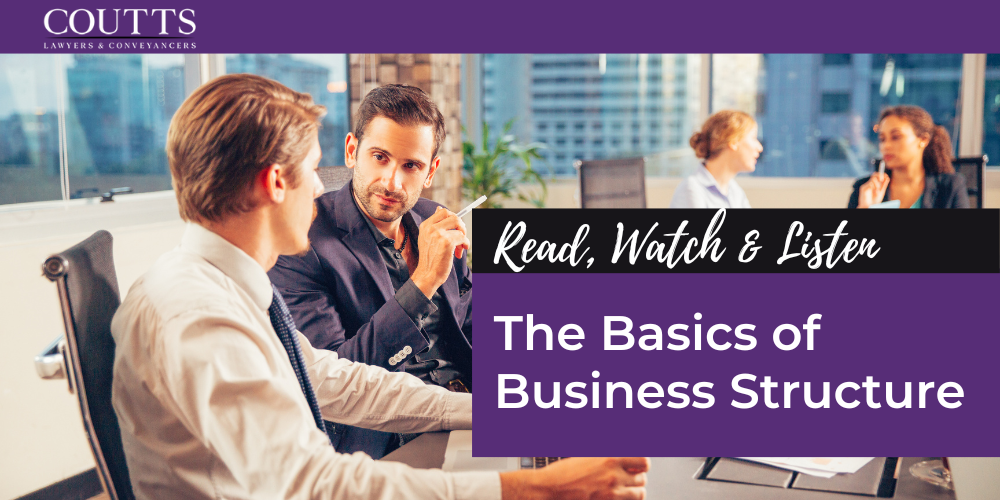Whether you are taking on a new challenge and looking to open your own business or purchase an existing business, it’s important to think about what business structure is right for you. You may even be running a business already and considering changing the current structure. Either way you should know the options available to you.
There are four common types of business structures with lots of different pros and cons for each structure.
Sole Trader
A sole trader refers to an individual running a business in their personal capacity. There is no separation between the personal assets of the individual and the business assets of the business.
This is a simple structure and one of the easier structures to set up. Often the sole trader just needs to obtain an ABN and register to business (although some trades/professions will have regulations or licensing requirements governing the sole trader). A sole trader is most common in small businesses such as tradies or home businesses.
A sole trader can employ staff, enter into contracts and usually just lodges a personal tax return.
One of the biggest risks as a sole trader is that you are liable for the debts of the business. Essentially, you could be putting your personal assets at risk as your personal assets could be used to satisfy the liabilities of the business.
If you pass away, the business assets are inherited by your beneficiaries, but the business does not continue to run.
Partnership
If two or more people want to operate a business together, they can establish a partnership. The maximum amount number of partners is usually 20 with some exceptions such as law firms. Similar to a sole trader, a partnership is not a separate legal entity.
The partners can enter into contracts, own assets and borrow loans.
Most commonly the partners will enter into a partnership arrangement to govern the terms of their partnership. The agreement should set out the rights and responsibilities of each partner, the division of profits, how to deal with a dispute and termination of the partnership. Depending on the terms of the partnership agreement, generally, if a partner dies or exits the partnership, the partnership is terminated, and the remaining partners are in a new partnership.
The issue with partnerships is that all the partners are responsible for the partnership. This means that one partner could be liable for debts of the partnership incurred by another partner so it’s important to think about who you want to partner up with. Partnerships put the personal assets of the partners at risk as their personal assets could be used to pay debts of the partnership.
Company
A company is a separate legal entity which is established to run a business. The company is governed by the Corporations Act 2001(Cth) (Corporations Act) and a company constitution is created to dictate the procedures for meetings of directors and shareholders. Alternatively, a company could use the replaceable rules under the Corporations Act instead of preparing a constitution or use a mixture of both.
A company will consist of a director/s and shareholder/s. A director is responsible for managing the company, whilst a shareholder holds an interest in the assets of the company, usually with a limited liability as to the debts.
A director has a number of director duties under the Corporations Act and can be subject to civil and criminal penalties for breaches of their duties.
As the company is a separate legal entity, the company can enter into contracts, hire employees, and has perpetual succession, which means the operation of the company does not end if a director or shareholder passes away.
A company is meant to be responsible for its own assets and liabilities. However, in some cases directors may be personally liable for example if they signed a personal guarantee when the company entered into a loan agreement.
A company may be more expensive to establish and may have ongoing auditing and reporting requirements.
Trusts
Trusts are another way to run a business, the most common trusts are unit trusts or discretionary trusts. The trust will have a trustee who holds the property on trust for the beneficiaries.
A trustee of a trust could be a company or an individual. The trust will be established with a trust deed which governs the trust.
Trusts can be flexible with how they distribute income to beneficiaries which may have some tax advantages. For example, the trustee could distribute income to all or some of the beneficiaries (who can be family members).
There is no public disclosure requirements of the finances of the trust so this structure can offer more privacy.
Due the complex nature of a trust it may be more expensive and difficult to set up.
Choosing the right structure
Each structure has its different advantages and disadvantages so it’s important to consider what option works best for you and your business. Coutts can assist in guiding you to find the right fit which factors in protecting your assets, the costs and complexities of setting up the business and maintaining the structure. Coutts Lawyers & Conveyancers can collaborate with financial advisers so that you can ensure you also chose a structure which has the most advantageous tax implications for your business.
For further information please don’t hesitate to Contact Coutts today.
This blog is merely general and non specific information on the subject matter and is not and should not be considered or relied on as legal advice. Coutts is not responsible for any cost, expense, loss or liability whatsoever in relation to this blog, including all or any reliance on this blog or use or application of this blog by you.



